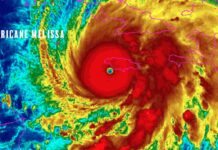
“Knowledge is still not being put into practice quickly enough, and knowledge is not shared”
By Laurie Goering
LONDON – (Thomson Reuters Foundation) – From irrigating crops with less water to revising building codes to help new infrastructure weather floods and storms, the world needs to invest more in preparing for the accelerating impacts of climate change, experts said on Tuesday.
Adjusting to a warmer world will require strong political leadership, new sources of funding and a push to expand what works – but it will end up saving cash, top officials said as they launched a Global Commission on Adaptation in The Hague.
“Knowledge is still not being put into practice quickly enough, and knowledge is not shared,” Kristalina Georgieva, CEO of the World Bank, told journalists.
“Decisions are still being made with short-term and not long-term risks in mind,” she warned.
If that continues, it could push more of the world’s poorest – from Africa’s Sahel to low-lying island nations – back into extreme poverty, she said.
But businesses and richer countries also face significant threats as worsening heatwaves, cyclones, wildfires, floods and other hazards imperil food and water supplies, and could lead to more deaths, said former U.N. Secretary-General Ban Ki-moon.
By 2030, adapting to those growing stresses could cost the world $300 billion a year, growing to $500 billion a year by 2050, he added.
The new commission aims to bring together expertise from around the world to identify the best ways of adapting to climate change pressures.
Its members will be drawn from 17 countries, from China and India to Ethiopia, Indonesia, the Marshall Islands, Costa Rica and Canada.
Among other goals, it will explore how to raise the money and build the political will required to put adaptation measures into practice everywhere they are needed.
They range from protecting and planting mangroves to buffer coasts from storms to tightening building codes to make new infrastructure able to withstand wild weather, Georgieva said.
The commission will be overseen by Ban, Georgieva and Microsoft founder Bill Gates, and will focus on adaptation in four areas: food and rural livelihoods, infrastructure, cities and industry, its backers said.
COSTLY DISASTERS
Work to figure out what is effective in adapting to climate change and trying to spread those approaches is not new, said Saleemul Huq, director of the Dhaka-based International Centre for Climate Change and Development.
Bangladesh, for instance, faced with rising seas, more floods and powerful storms, has already cut deaths from cyclones by building elevated concrete shelters in coastal areas.
“In some cases, the (global) South actually has a lot more knowledge than the North on adaptation, as it’s already dealing with the problems,” said Huq, who has run an annual international conference on adaptation for more than a decade.
But if the new commission can mobilize the money needed to scale up solutions, it will provide a huge service, he said.
The commission hopes to put adaptation to climate change on a more equal footing with efforts to cut carbon emissions, which have accounted for the vast majority of climate spending so far.
Achieving that “will undoubtedly require significant investment from the private sector”, a launch report noted.
That has been difficult to obtain so far because it is harder for business to spot profit opportunities in adaptation.
But that is changing as extreme weather increasingly hits business supply chains – and as the costs of cleaning up after disasters soar, Georgieva said.
Each $1 spent on reducing disaster risks can prevent $4 to $7 in damage later, she said.
“The sense of urgency in the fight against climate change has dramatically increased because the economics of climate action are so very clear and obvious,” she said.
Making insurance policies mandatory, for instance, could encourage construction in areas of lower flood risk, to avoid higher premiums, she said.
The launch report said getting banks and other financial institutions to “commit to publicly disclose information about climate risks… could influence trillions of dollars of investment in infrastructure and industries that are at risk due to climate change”.
Up to $90 trillion in new investment in urban infrastructure is required around the world by 2030, it noted.
“The nature of that investment will play a significant part in determining whether we create a low-carbon, climate-resilient world,” it added.
(Reporting by Laurie Goering @lauriegoering; editing by Megan Rowling Credit: Thomson Reuters Foundation






